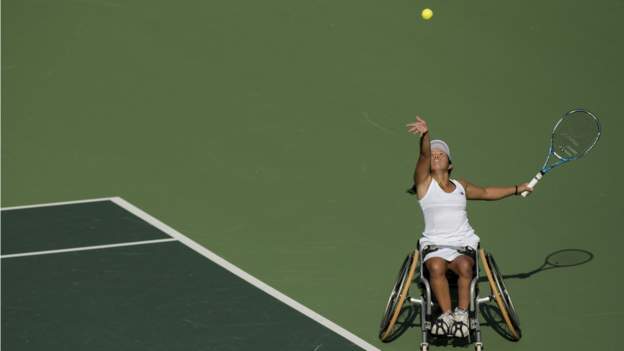
Key information
Dates: 27 August-4 September
Venue: Ariake Tennis Park
Gold medals on offer: Six
How does it work?
Wheelchair tennis is broadly similar to the non-disabled game but with a couple of key differences.
Players can allow the ball to bounce twice and while the first bounce must be inside the court boundaries, the second can be inside or outside.
In addition, at the serve, the server must be in a stationary position before serving the ball, but is allowed one push of the wheelchair before striking the ball.
Matches are the best of three sets and a tie-break settles each set as required.
Players compete in the men's, women's and quad divisions. The men's and women's division is for players whose impairment affects up to two limbs while those whose impairment affects three or more limbs compete in the mixed-sex quad division.
Who are the British medal hopes?
Gordon Reid and Alfie Hewett took singles gold and silver in Rio, plus doubles silver, and both will be strong contenders again. Jordanne Whiley and Lucy Shuker will be bidding to win another doubles medal while in the quad division, Andy Lapthorne will be challenging to add to his medal tally.
Who are the other challengers?
Hosts Japan have two strong contenders in Shingo Kunieda, the current men's number one, and Yui Kamiji, the world number two in the women's game. Kunieda won gold in Beijing and London but missed out in Rio while Kamiji won bronze five years ago. The Dutch are always strong, particularly in the women's game, with Diede de Groot chasing her first individual gold.
Did you know?
Leading player Kgothatso Montjane, known as KG, was the first black South African woman to compete at Wimbledon when she took part in 2018 and is a six-time winner of her country's Sportswoman of the Year with a Disability award.
ParalympicsGB Rio 2016 medals
Six - one gold (Gordon Reid), three silver (Alfie Hewett, Hewett & Reid, Andy Lapthorne) and two bronze (Lapthorne & Jamie Burdekin, Jordanne Whiley & Lucy Shuker)















 Phone: (800) 737. 6040
Phone: (800) 737. 6040 Fax: (800) 825 5558
Fax: (800) 825 5558 Website:
Website:  Email:
Email: 






